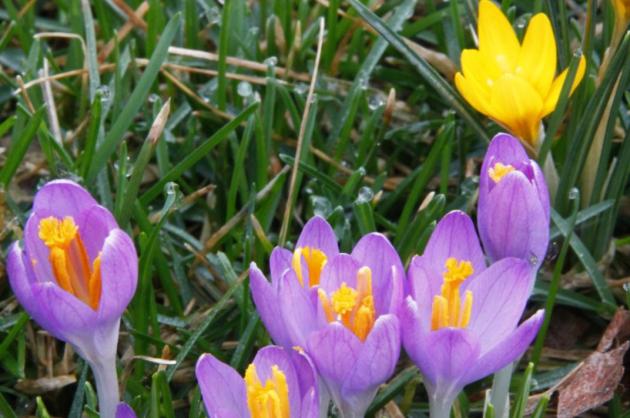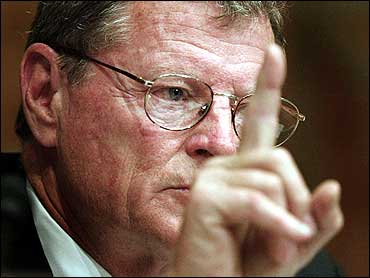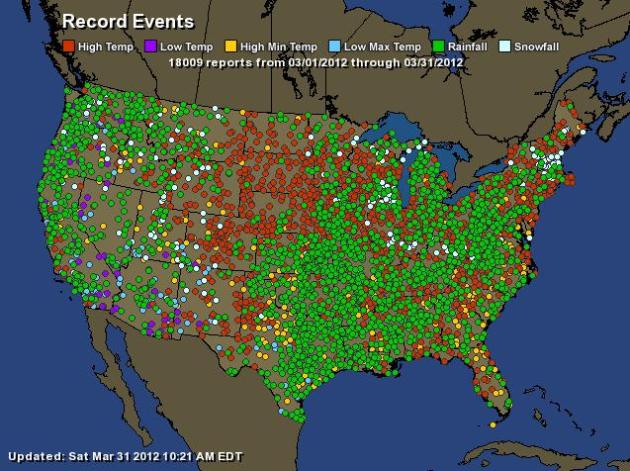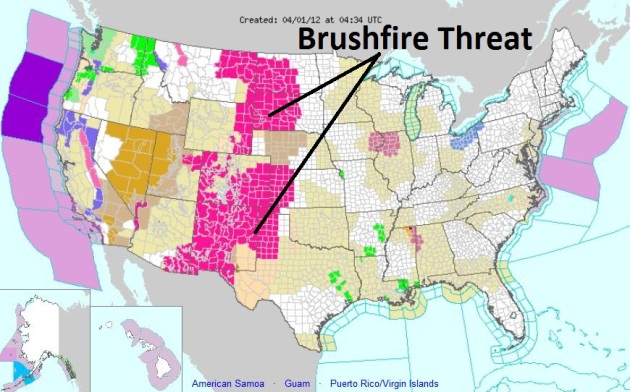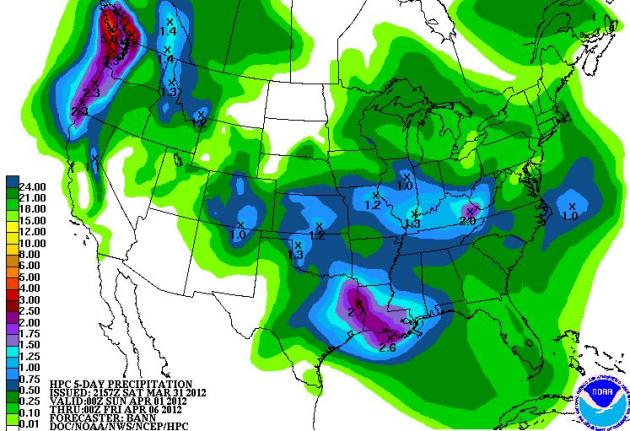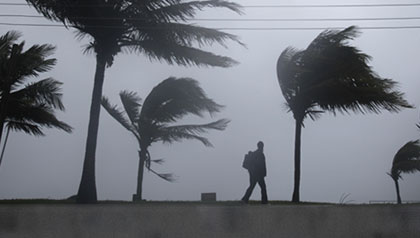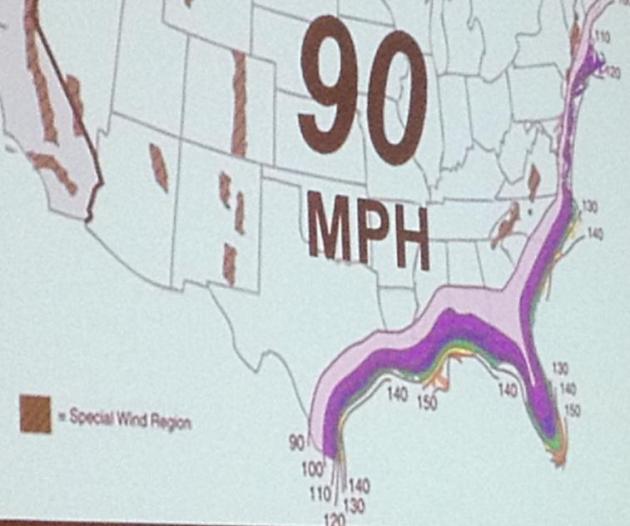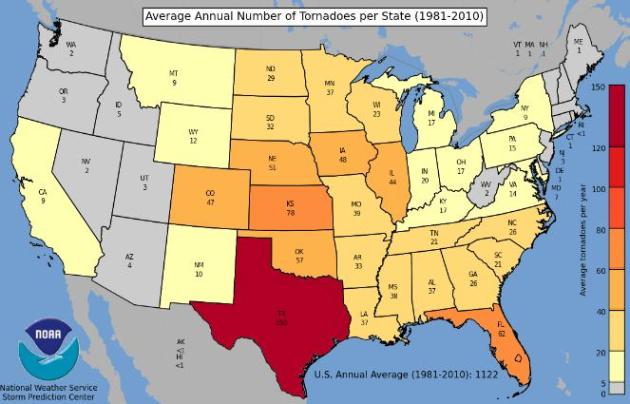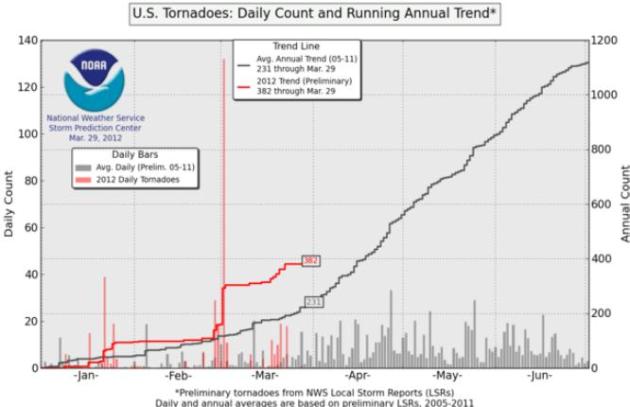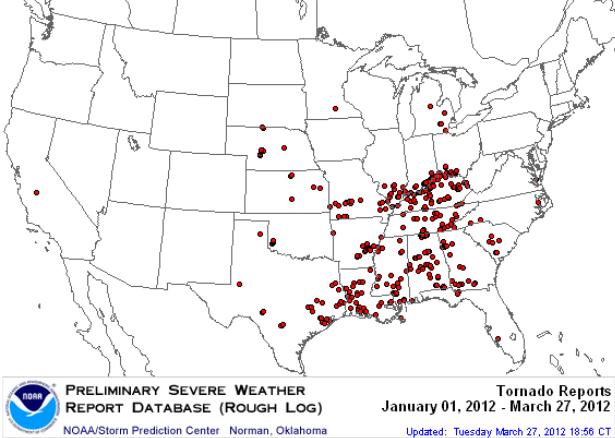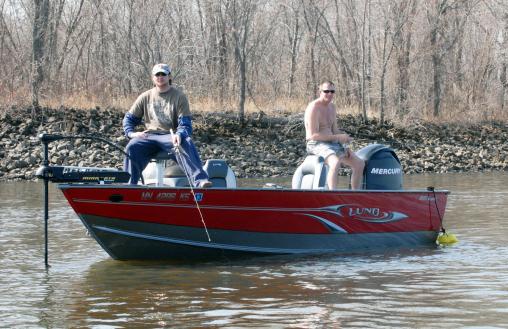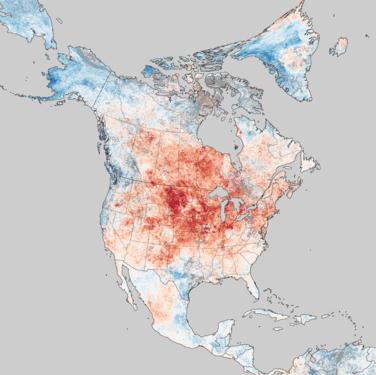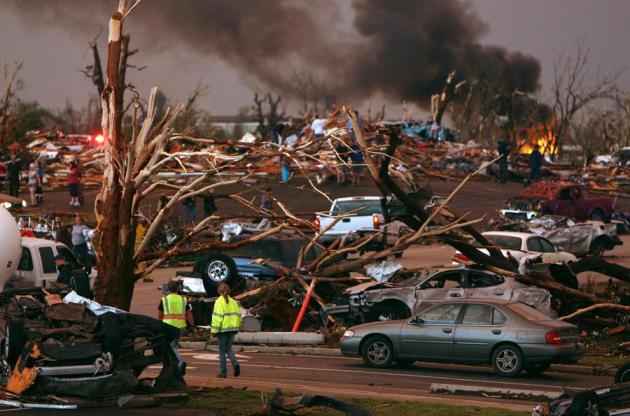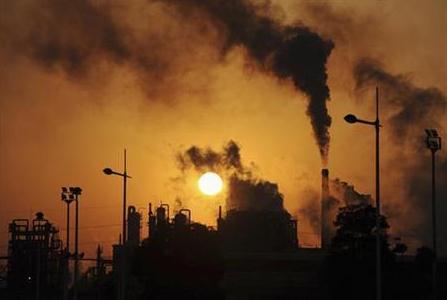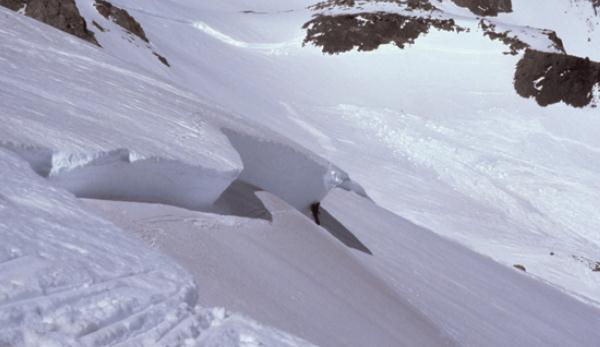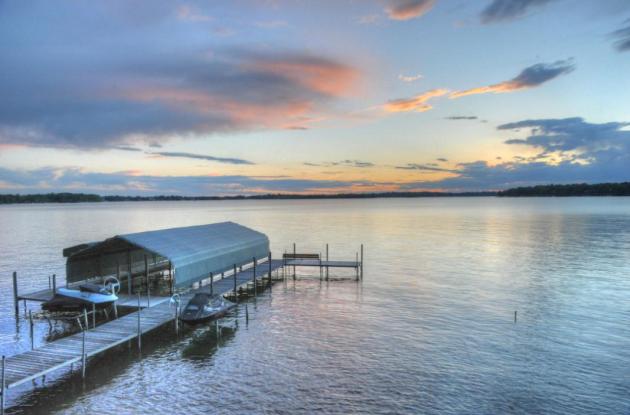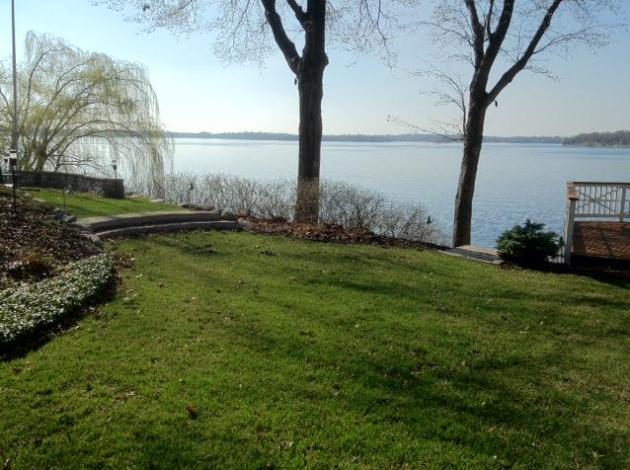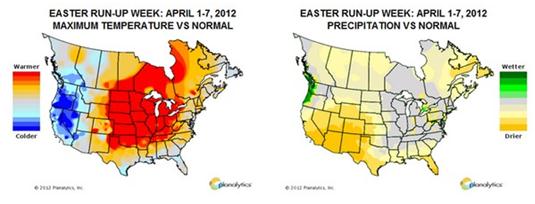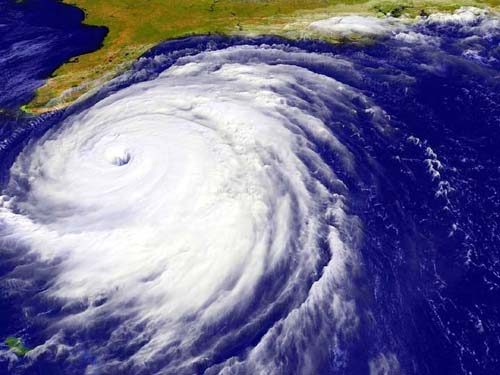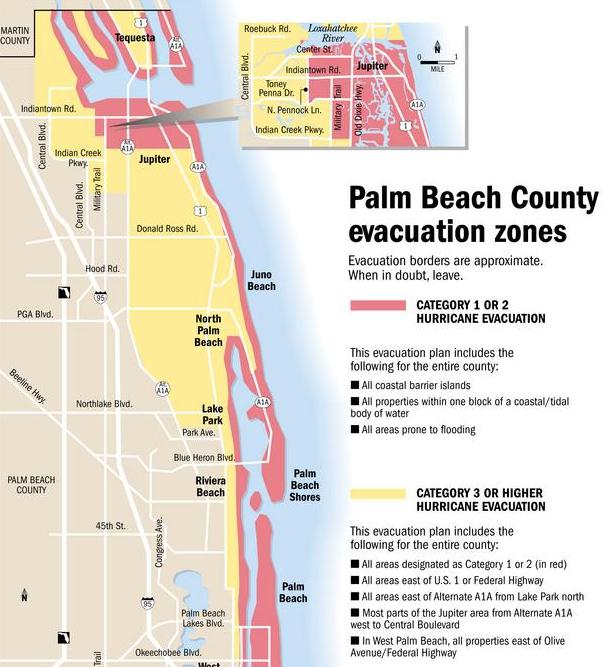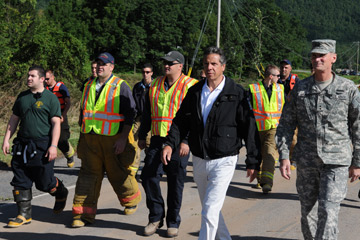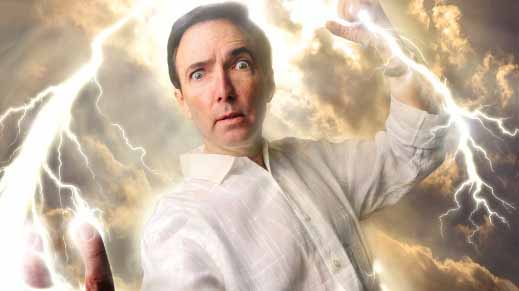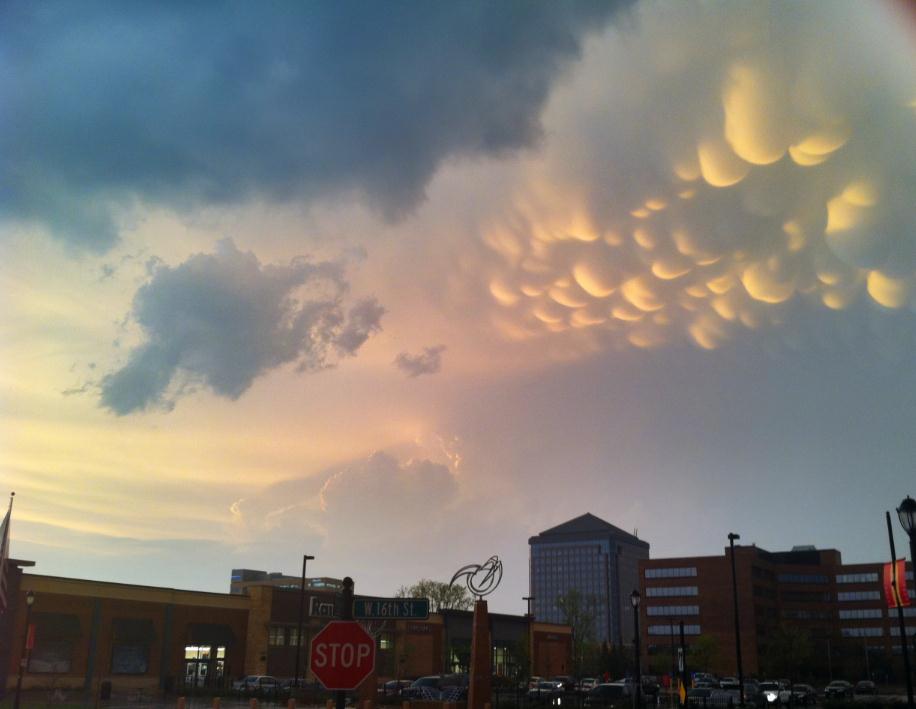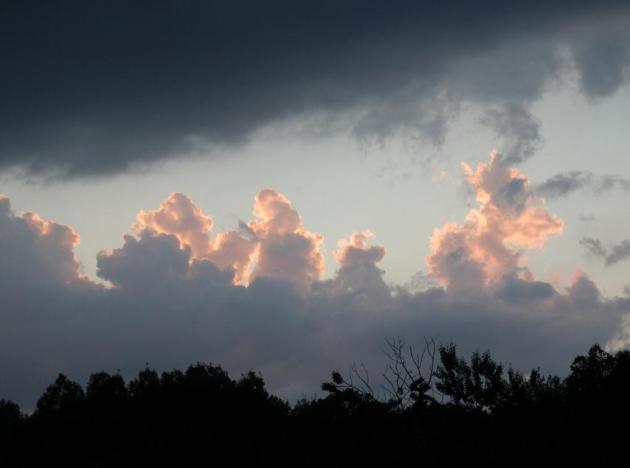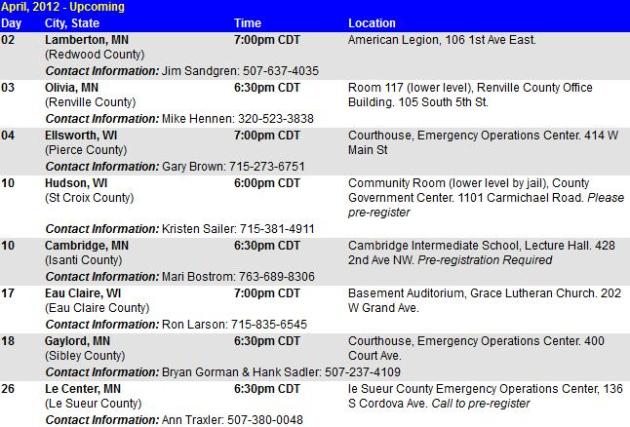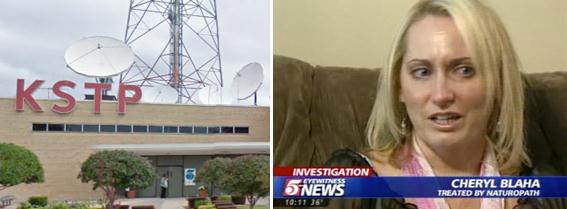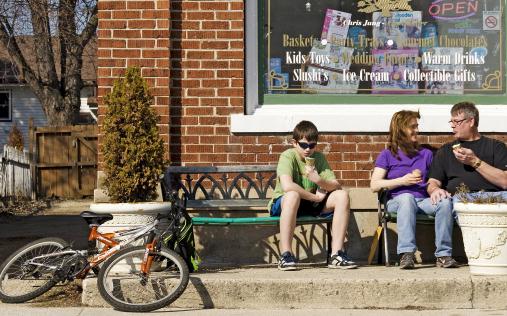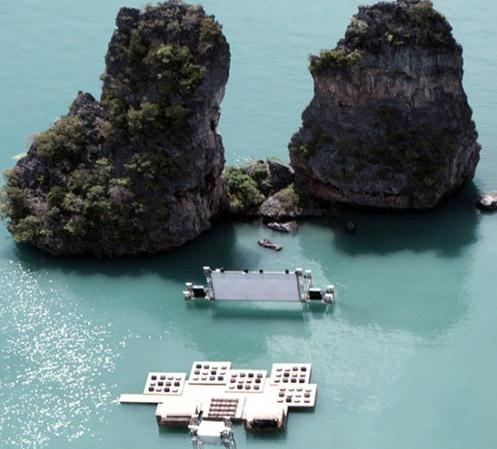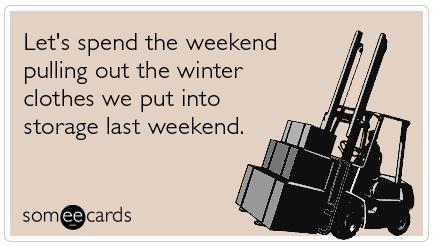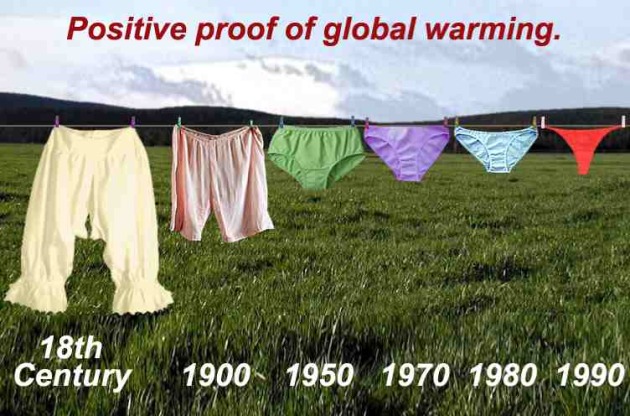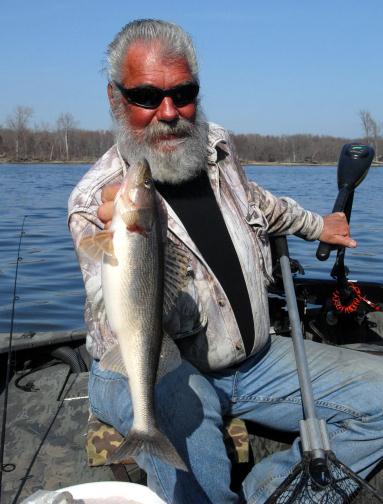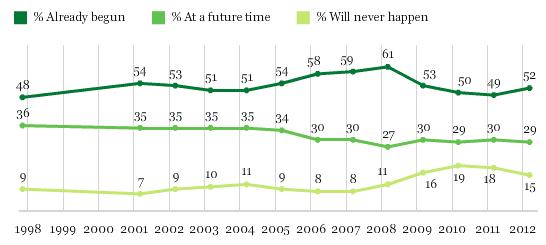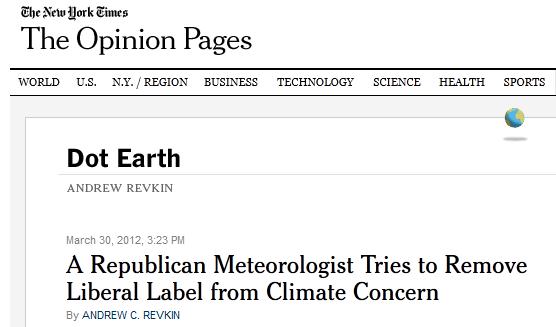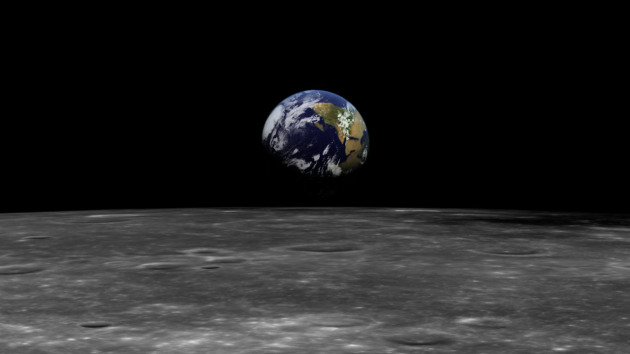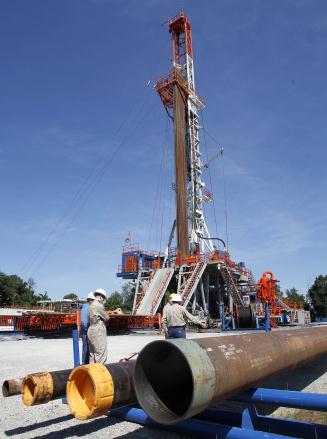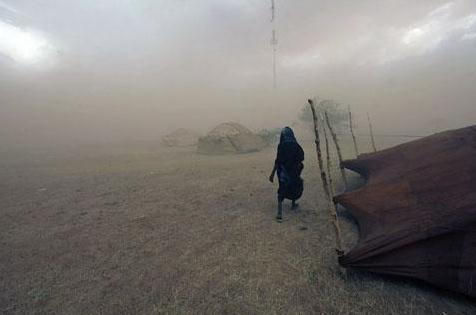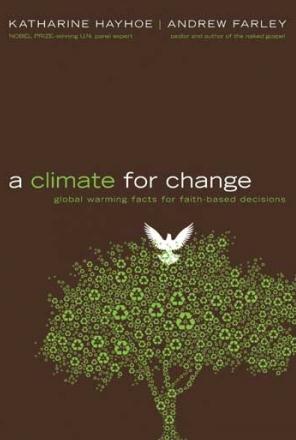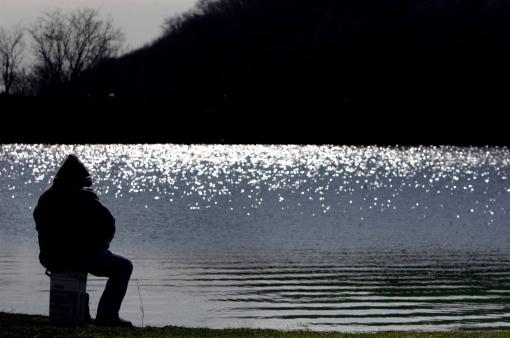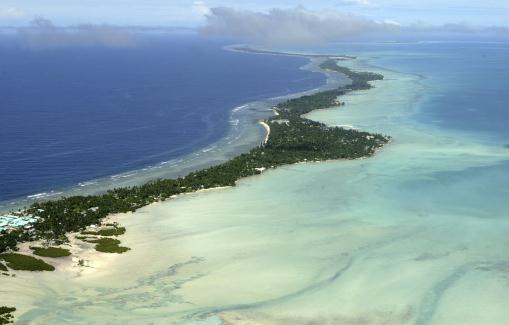1.3" final March snowfall in the Twin Cities.
10.2" average March snow at MSP.
8.2" March snowfall last year.
84.7" snow had fallen as of March 31, 2011. So far this winter season:
22.3"
19 Twin Cities record for warmth between March 10-24. Source:
Minnesota Climatology Working Group.
18,009 daily records set across the USA so far in March. Details from Ham Weather below.
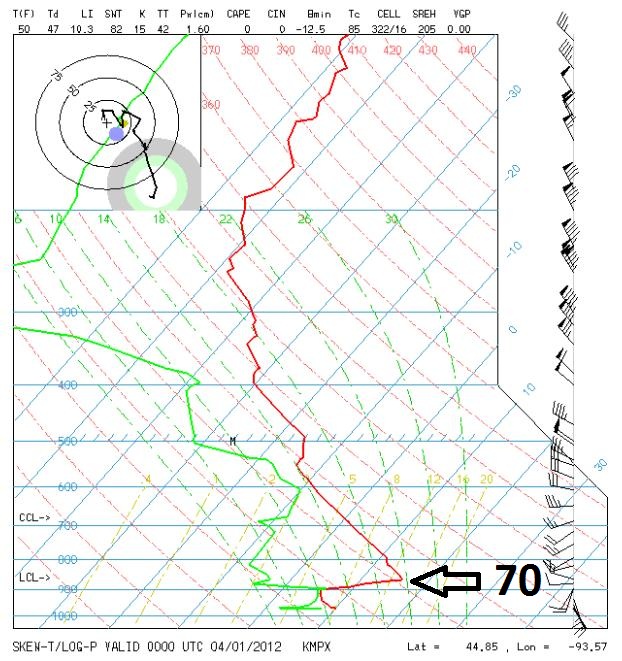 Forecast-Busting Inversion
Forecast-Busting Inversion. Yep, I was the one out there yesterday, with the jacket and binoculars, searching in vain for hints of the sun. A stubborn east wind kept surface temperatures stuck in the 50s, while 2,000 feet above the ground the temperature was close to 70F. Ugh. Warm air can't just shove chilly air out of the way; it was forced to rise up and over this cold wedge. Warm air rises, cold air is content to linger - it has to retreat on its own before we can enjoy 70s and sunshine. The one thing that worries me today: winds at ground level are forecast to blow from the east/southeast. To maximize warmth (and spying the sun) I'd like to see a south/southwest wind. I think it'll be brighter and milder than yesterday, but if stratus and fog lingers into the afternoon we may be stuck in the 60s, with 80s likely south/west of the Minnesota River. That's a long-winded way of saying "don't count on the sun coming out today."
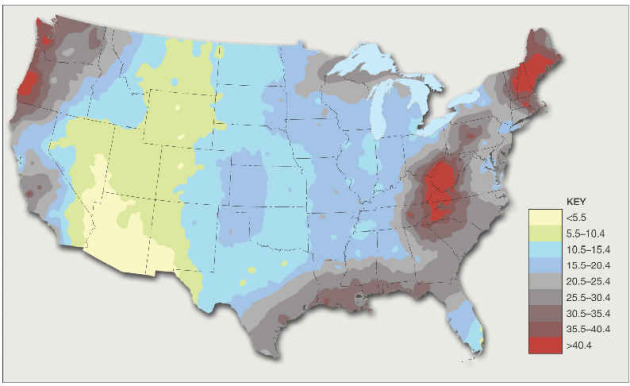 Foggy Possibilities
Foggy Possibilities. On average MSP
sees an average of 10-15 days/year with dense fog. That compares with 25-30 days from Duluth to the North Shore of Lake Superior, as many as 40-75 days for the Appalachians, northern New England and the coast of Oregon. Source:
Wichita office of The National Weather Service.
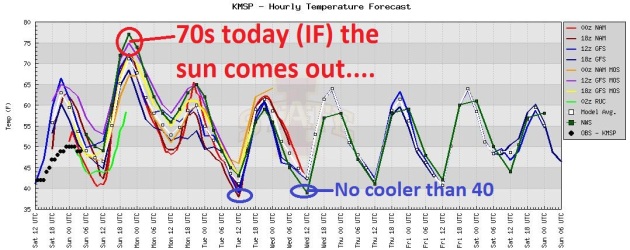 High Bust Potential
High Bust Potential. IF the sun comes out today (and we break through a stubborn inversion) the mercury should climb into the 70s - but again - I'm worried about a nagging east/southeast breeze keeping clouds and stratus overhead much of the day, in which case we'd have to be content with low to mid 60s, if that. A tough forecast. We cool off (slightly) this week, but nighttime lows shouldn't dip much below 40 F.
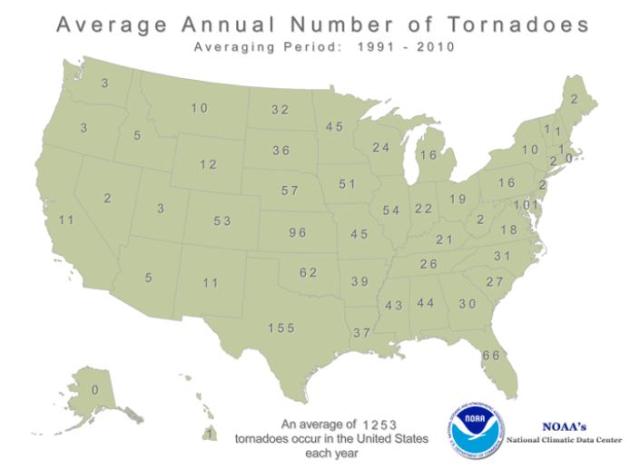 45
45. The average number of tornadoes in Minnesota has risen to 45. When did that happen? 10 years ago the average annual tally was closer to 25. This may be a function of Doppler radar picking up more (small/weak)
EF-0 tornadoes, that, 20 years ago, didn't even show up on the maps and went largely undetected. Map courtesy of NOAA
NCDC.
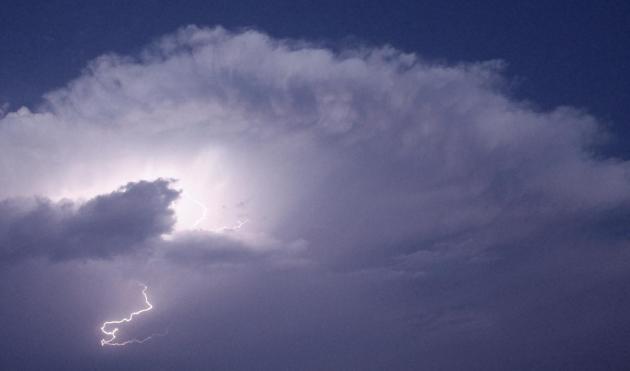 Electrifying
Electrifying. Thanks to Bryce Link for sharing a pic from strong T-storms that bubbled up along an active warm front near Ames, Iowa Saturday evening.
"
More temperature records were broken this month than any month since the Dust Bowl Era of the 1930s." - Dr. Mark Seeley; more details in his Minnesota WeatherTalk - highlight below.
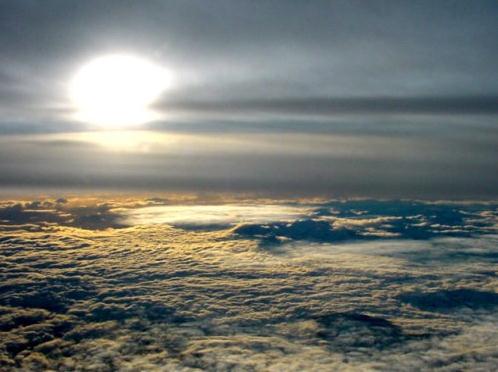
“
I used to say things like, ‘It’s really difficult to attribute any one single event to climate change, but some of these are certainly consistent with what our broad body of science says is occurring,’” Dr. Shepherd said. “More recently, I’ve been saying: ‘We may already be seeing examples of a new normal.’” - J. Marshall Shepherd, head of atmospheric sciences at the U. of Georgia, in a New York Times article below.
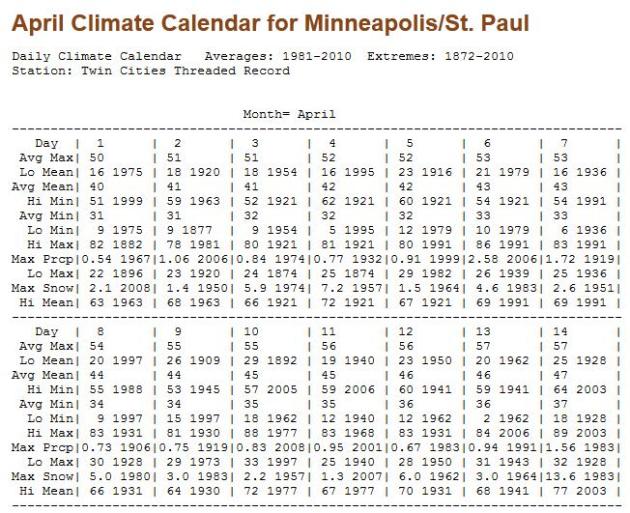 April Weather Calendar.
April Weather Calendar. The average high for today is 50 F. in the Twin Cities - by the end of the month the normal high is 65 F. Click here to see the April Calendar, courtesy of
The Minnesota Climatology Working Group. Oh yeah - at the risk of trying to be too thorough, an average April brings 3.1" snow, according to
NOAA (1971-2000 data set). That number may have come down in the latest 30 year rolling average.
"
But Inhofe's recent interview with MSNBC's Rachel Maddow has put the Senator's climate change denial in a whole new light. Of global warming, he told Maddow, "I thought it must be true until I found out what it cost." - from a story at Huffington Post. Details below.
Saying Goodbye To One Crazy March. 18,009 records in March? Good grief. I asked our (amazing) developers at
Ham Weather to come up with a special graphic showing ALL records for March, to date. Here is the result. If you go to the Ham Weather site you can call up just record 24 hour rainfall reports, or all warm weather records (more than 13,000 and counting). What a month...
| Total Selected Records: | 18009 |
| Rainfall: | 2913 |
| Snowfall: | 522 |
| High Temp: | 6809 |
| Low Temp: | 290 |
| Low Max Temp: | 634 |
| High Min Temp: | 6841 |
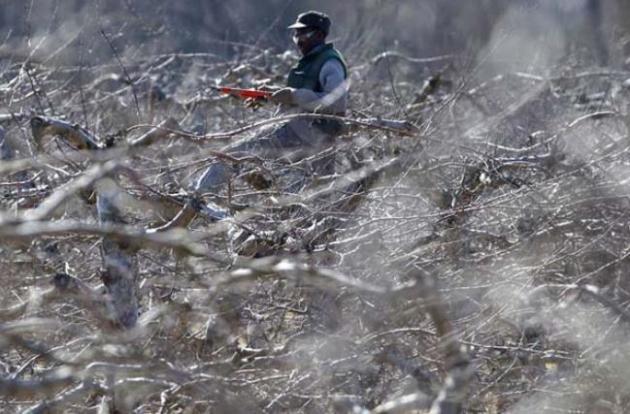 What's Worse Than An Early Spring?
What's Worse Than An Early Spring? Early Spring Followed By A Freeze. Here's an excerpt from
The Huffington Post: "
Why is that a problem? Freezing temperatures following warmer weather could mean millions of dollars in crop losses--and higher prices for lower quality produce at the market. Given the cold overnight temperatures over the last few nights in some parts of the country--and the possibility of more frost over the next few weeks--that could be what's in store for this year. This scenario played out back in 2007. The eastern half of the United States experienced unusually warm temperatures in March--the second warmest in U.S. records to date--prompting trees and other plants to develop earlier than usual. This premature leaf and bloom made them vulnerable to a mass of cold Arctic air that swept through the central Plains, the Midwest, and much of the Southeast. Between April 4 and 10 there were more than 1,200 record lows in the lower 48, with temperatures in the South over the Easter weekend dipping below 25 degrees F, which can wipe out 90 percent or more of most crops."
Photo credit above: "
A worker at Goold Orchards in Schodack, N.Y., was pruning apple trees two weeks ago. This week, orchards from the Midwest to the East Coast were threatened by overnight frosts. (Mike Groll/AP)."
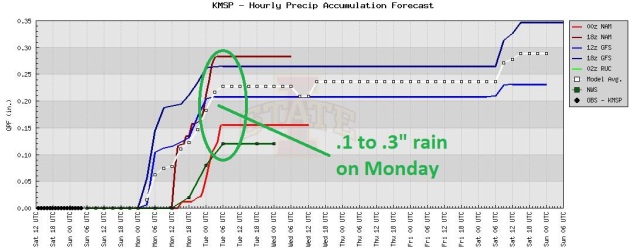 Monday Frontal Passage
Monday Frontal Passage. An eastbound cool front may spark a few showers and T-storms from tonight into Monday, anywhere from .1 to .3". Then again we're in a drought - so expect rainfall at the low end of that range. Sorry to be a cynic.
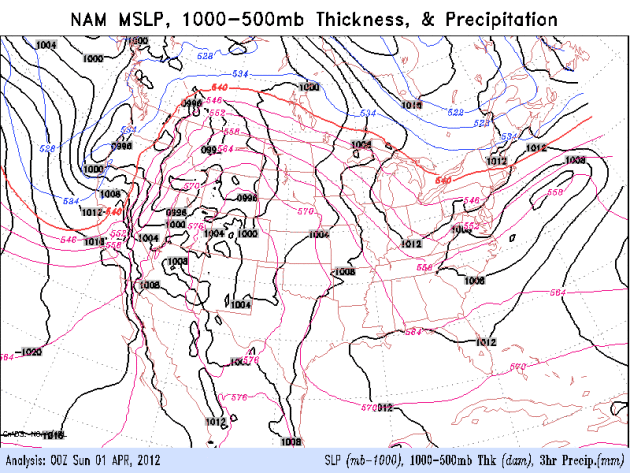 84 Hour Weather Trends
84 Hour Weather Trends. The NAM model shows a few T-showers bubbling up over northern Minnesota Monday as cooler air pushes east; a never-ending parade of storms buffeting the Pacific Northwest with more rain and snow.
Growing Brushfire Risk. Look at how much of the USA is covered under a "Red Flag Warning", meaning a heightened risk of fire. The combination of record warmth, a lack of significant rain (or snow), low humidity levels and gusty winds has created a ripe environment for fires to spread rapidly. We need rain. Map:
NOAA.
Moisture Imbalance. The Pacific Northwest is grappling with flooding rains and record mountain snows, with significant rain for much of the south and Ohio River Valley. Precious little rain is forecast from the Upper Midwest into the southwestern USA. QPF map:
NOAA.
Not Quiet Out Of The Woods Yet. Although we have a continued warm bias, the GFS continues to pull chilly Canadian air south of the border, the latest (00z) model run hinting at a little frost for the suburbs around April 10-11. I still can't quite believe we'll sail into May without at least one more frosty episode.
Amazing Stat. Thanks to meteorologist Eric Fisher for tweeting this, and Mark Vogan (in Scotland!) for the retweet. Just to be clear, Chicago just experienced the 5th warmest April on record...in March. Soon pigs will be flying, Snooki will get her PhD and Rush Limbaugh and Rachel Maddow will get engaged. I'm afraid to see what comes next...
"
With the onset of El Nino, coupled with cooler water now in the tropical Atlantic and higher atmospheric pressure in the formation zone as well, the signals are suggesting a normal to perhaps even below normal 2012 hurricane season," said Klotzbach. - from a story focused on how severe 2012's hurricane season will be from WDAM-TV below.
Time To Strengthen America's Building Codes? The graphic above is from meteorologist (and engineer) Tim Marshall, who gave a talk at the Des Moines NWA Severe Storm & Doppler Conference. The minimum threshold for building codes across most of the USA is 90 mph. Buildings (commercial and residential) are designed to withstand only a 90 mph wind gust. Those codes are much higher along the East Coast and Gulf Coast, threatened by hurricanes, where minimum thresholds are 90-150 mph. More details on the conference below.
Tornado Averages. Minnesota sees an average of 37 tornadoes every year, 23 in Wisconsin, 48 in Iowa. These numbers have gone up with the latest rolling 30 year (1981-2010) averages. Map courtesy of
SPC.
Another Busy Tornado Year. We've already seen 383 tornadoes so far this year, compared to an average of 231 as of the end of March. Graph from
SPC.
Confirmed 2012 Tornadoes (So Far). Here is the latest count, with confirmed touch-downs showing up as red dots. Notice the eastward shift in tornadoes - which (call me crazy) seems to be a trend. The biggest, deadliest, most violent and long-lasting tornadoes are touching down in Dixie Alley, not traditional Tornado Alley, which runs from Iowa to Texas. Map:
NOAA SPC.
“We work with a lot of sportsmen and -women across the nation, and we constantly hear back from them that they’re seeing the effects of climate change on the ground,” says Joe Mendelson, policy director for the Climate and Energy program at the National Wildlife Federation." - from an article in
The L.A. Times below. Photo credit: Dennis Anderson
"
We've never seen these kinds of temperatures before. It's quite remarkable," Dave Phillips, a senior climatologist at Environment Canada, a government agency, told local media. "The duration, areal size, and intensity of the 'summer in March' heat wave are simply off-scale," says Jeff Masters of the Weather Underground. "The event ranks as one of North America's most extraordinary weather events in recorded history." -
New Scientist takes a closer look below. Image above: NASA.
"
Already U.S. insured losses from weather disasters have soared from an average of about $3 billion a year in the 1980s to about $20 billion a year in the last decade, even after adjusting for inflation, said Mark Way, director of sustainability at insurance giant Swiss Re." - from a Chicago Sun Times article below. Image above of the April 27, 2011 tornado aftermath in Tuscaloosa, AL courtesy of AP.
"
My take is that there is no longer "natural" weather. Change the canvas (climate) and all pictures (weather) painted on it are affected." - Dr. Scott Mandia, Professor - Physical Sciences, Suffolk County Community College
"
The effects on ice fishing are pretty obvious but less so elsewhere. For example, moose in Maine, New Hampshire and Minnesota are dying in record numbers, and the culprit is winter ticks. A moose might ordinarily carry 30,000 ticks; normally, cold weather kills off or controls the parasites. A study cited in the report says that warm winters might increase that number to 160,000 ticks. Enough to kill even a moose." - excerpt from an L.A. Times article below.
Photo credit: "
Collar about to be deployed on moose in Voyageurs National Park. Sample collection bag on the on right contains supplies for handling this moose. Hair, fecal pellets, and ticks were collected. UMD/NRRI photo credit."
"
My climate epiphany wasn't overnight, and it had nothing to do with Al Gore....
No, you're not imagining it: we've clicked into a new and almost foreign weather pattern. To complicate matters I'm in a small, frustrated and endangered minority: a Republican deeply concerned about the environmental sacrifices some are asking us to make to keep our economy powered-up...Here's what I suspect: the patient is running a slight fever. Symptoms include violent tornado sneezes, severe sniffles of flooding and raging rashes of jaw-dropping warmth. It's 85 in March. What will July bring? It's as if Mother Nature seized the weather remote, clicked America's seasons on fast-forward, turning the volume on extreme weather up to a deafening 10. This isn't even close to being "normal". Weather Underground's Dr. Jeff Masters put it best. "This is not the atmosphere I grew up with." - from my recent Op-Ed about how acknowledging climate science doesn't necessarily make you a liberal. It sure as heck doesn't make you popular. I'm not expecting a Christmas card from Rush or Fox News this year. So it goes. Details below.
"
Now if you’re trying to figure out how to get to your job interview or dinner with friends you can also account for what route might be the fastest. Google Maps has added the ability to see the estimated time of your journey using real-time traffic data." - from an article from Mashable, details below. PS: be on the lookout for the woman above, reading a novel and on her cell phone in bumper-to-bumper traffic. Be afraid.
Nestle Is Making Tastier Ice Cream Using Avalanche Research? Yup. Details below. Photo:
ESPN, Mike Moore, NOAA.
"
It is when God appears to have abandoned us that we must abandon ourselves most wholly to God." - Francois Fenelon
A March To Remember. Odds are we will never live through another March this (freakishly) warm. Dr. Mark Seeley has a great recap of an extraordinary month in his weekly
Minnesota WeatherTalk blog: "What a month! More temperature records were broken this month than any month since the Dust Bowl Era of the 1930s. Within the USA it is estimated that 6,500 to 7,000 daily high temperature records were set or tied during the month of March. This compares to only 300-400 new low temperature records during the month, mostly in western states. Across Minnesota climate stations 424 new daily high temperature records were set and 327 new daily warm low temperature records were set in March, including 8 new statewide daily high temperature records,, and for many observers (MSP included) the earliest date for an 80 degrees F reading (March 17). In addition many observers reported the highest dewpoints ever measured in the month of March, some even in the 60s F. You can see more record setting temperatures at two web sites....."
Easter Preview 2012. From a weather firm called
Planalytics: "
Recently, more seasonal conditions have allowed for periods of cooler temperatures throughout North America. As we head into the holiday run-up week, cooler conditions to recent weeks will continue, though temperatures will trend warmer than last year and normal for the majority of North America. Most locations in the East can expect light precipitation throughout the first half of the week, while severe weather is expected from the Northern Plains to Texas and the Mississippi Valley. By the holiday weekend, a gradual warm-up will occur for the eastern two-thirds of the continent, with dry conditions favorable for restaurant and retail traffic along the East Coast. Interior locations can expect showers and thunderstorms to continue into the holiday weekend."
Hurricane Season Expected To Be Below Average. La Nina is fading; we may be heading into a mild/moderate El Nino (warming) phase later this year. La Nina summers tend to bring stronger winds over the tropics, shredding developing storms, lowering the risk of intensification of tropical systems. WDAM-TV has a story about the potential for a busy hurricane year in 2012:
"...
Speaking at the National Hurricane Conference in Orlando, FL this week, Klotbach presented research that suggested key meteorological parameters just weren't ling up for a big season. "With the onset of El Nino, coupled with cooler water now in the tropical Atlantic and higher atmospheric pressure in the formation zone as well, the signals are suggesting a normal to perhaps even below normal 2012 hurricane season," said Klotzbach." Image above courtesy of NASA.
Fleeing Hurricanes: Southeast Florida Is 5th Worst For Evacuations Problems. Here's a story from
The Palm Beach Post that highlights one of our biggest concerns: getting people in high-threat hurricane zones (barrier islands) inland, to safer regions, in a short period of time: "
ORLANDO — Southeast Florida, including Palm Beach County and the Treasure Coast, is the fifth-biggest problem region in the U.S. for hurricane evacuation, an engineering consultant said Thursday. And it doesn't get better: The top two are nearby. The second-worst is Tampa Bay, and the worst is Southwest Florida, Donald Lewis of Tampa-based Atkins North America said on the closing day of the National Hurricane Conference. Those two regions could be evacuating at the same time as each other - and perhaps at the same time as Palm Beach County - in the approach of a monster storm, creating a catastrophic traffic jam."
Year Of The Floods, Part 5: The Flood Next Time. Here's a story (audio) from North Country Public Radio: "
(03/30/12) During this pledge drive week, we've been looking back at the North Country's Year of the Floods, from the spring floods last April to the sudden devastation of tropical storm Irene. By all accounts, the immediate response to the floods was swift and professional. That prevented loss of life and limited damage to property. But months later, the clean-up continues and long-term questions remain about future flooding."
Photo credit above: "
Governor Andrew Cuomo has called for changes to the way New York plans for future floods (NCPR File photo)."
"Ask Paul". Weather-related Q&A.
"Paul, We have noticed that storms be it winter or summer seem to part at Alexandria and re-join. Do you know if anyone has studied this or are even aware of it. Storms generally hit Glenwood then part for Alexandria and re-join for Miltona- Parkers Prairie. We have often wondered if it is due to elevation, or the many lakes in such a small area. If it is something you are or others are not aware of I recommend you just keep an eye on Alexandria this summer – it becomes actually funny. We watch the radar and wait for the “Alexandria parting” whenever there are big warnings. Thanks for all you do keeping an eye on the weather for all of us. Enjoy the blessings of your day." - Char
Char - you're not the first person to bring this up, and I wish I had an easy, intuitive explanation for this "splitting effect". My hunch (it's only a theory) has to do with river valleys and inflow winds associated with showers and thunderstorms. The natural terrain of the land may impact wind direction, and have the effect of nudging storms in a certain direction. I've never seen any research papers on this - but that's the only thing (that I can think of today) that explains this phenomenon.
_____________________________________________________________________
"Why are the clouds so beautiful in the Spring? (I'm thinking of the wonderful poem by Wordsworth: "I Wandered Lonely As A Cloud!"
Thanks!
Elaine Ambrose
Elaine - thanks for your note. I too have noticed that clouds seem to be better defined and generally more spectacular than during the summer or early autumn. I thought about this - it may have to due with a lack of haze, humidity and even dust in the air, which is a common appearance during the sultry summer months. With a cold upper atmosphere and heating of the ground you can wind up with more vertical development, more sprouting, cauliflower-like cumulus congestus (right), baby sprouts that often mutate into towering thunderheads. The
cumulonimbus mammatus example (upper left) is equally spectacular. "Mamma" form underneath thunderstorm anvils, often a tip-off that a storm has hail suspended 6-10 miles above the ground. That's one thing I never get tired of living in Minnesota: the free show unfolding outside every day. Take time to look up and enjoy the show!
____________________________________________________________________
"Hi Paul- I enjoy your forecasts and sounding the global warming alarm. So, why do you tout using the A/C as soon as it hits 80? You do understand the connection between coal burning plants and A/C demand and greenhouse gas emissions, right? At the least, turning the A/C on at 80 is contingent on the dew point, which we hope you would also forecast, or is the dewpoint hard to do? Keep up the good work."
Steve Pelton
Steve- good point. Mea culpa. You're right; I should know better. The fact that I'm even mentioning A/C in late March is beyond odd, but I should have been a little more sensitive to the heat-energy implications. Yes, at 80 you probably don't need air conditioning, just a cold (adult) beverage and some time out on the deck. 80F with a dew point of 50 is quite tolerable; if dew points rise into the mid 60s an 80F reading can be pretty uncomfortable. But the next time I reach for the thermostat I'll remember your admonishment and crack a window instead.
Interested In Becoming A Skywarn Storm Spotter? Doppler radar (even the new "Dual Polarization" radar that can - sometimes - see the "debris ball", the actual debris being thrown up into the air by a tornado on the ground, only goes so far. Meteorologists still rely on experts on the ground for verification, for "ground truth", to confirm that a rotating supercell is producing a wall cloud, or a funnel, or an actual tornado, or the size of hail, etc. Here's more information on classes for interested spotters from the
local Twin Cities NWS office: "
For Skywarn training in the Twin Cities Metro Area, the Metro Skywarn group also conducts Skywarn Training classes, taught by Metro Skywarn instructors. They are offering over 20 classes in the Twin Cities metro area this spring, and a schedule of those classes can be found by clicking here. Skywarn training classes on this schedule are all free, and last around 2 1/2 hours. Pre-registration for these classes is required only if specifically stated on this schedule. Additional classes will be added to the list if local officials request a class in their area. For more information on the Skywarn program, click here."
National Weather Service Budget Cuts Misguided, Misplaced. Here's an Op Ed (which I happen to agree with) from Steve Tracton at The Washington Post's
Capital Weather Gang: "
The NOAA fiscal year 2013 budget request (page 7), included in the Obama Administration’s submission to Congress, calls for more than $2 billion dollars for the agency’s weather satellite programs, an increase $163 million from 2012. Not surprisingly, the increase means other areas within NOAA are slated for decreased funding. Of interest here is that the President’s 2013 budget for the National Weather Service (NWS) reduces funding by $36.4 million in operations and research (page 4-63) Is there something wrong with this picture of enormous investments for satellites at the expense of relatively miniscule costs of valuable components of NWS’s operational mission? In the opinion of many, including myself, the answer is a confident yes."
Google Maps Now Includes Real-Time Traffic Data. Uh oh. Is there anything I can't get from Google? The Garmins and Magellans of the world that provide navigation (and some level of traffic) on dash-top units must be watching this development with a certain amount of unease.
Mashable.com has the details: "
Now if you’re trying to figure out how to get to your job interview or dinner with friends you can also account for what route might be the fastest. Google Maps has added the ability to see the estimated time of your journey using real-time traffic data. The new-and-improved feature offers estimated travel times within Google Maps based on current traffic conditions. So, if you’re heading across town to meet a new yoga instructor you’ll be able to see how long several routes might take with no traffic, as well as how long the expedition might be based on the traffic conditions right now."
The Future Of Mobile. This is a fascinating slide deck from Henry Blodget at
Business Insider. What we're seeing (today) is just the tip of the mobile iceberg: "
Yesterday, we hosted our IGNITION WEST: Future of Mobile conference in San Francisco. To kick off the conference, our BI Intelligence team—Pascal-Emmanuel Gobry, Alex Cocotas, and I—put together a deck on the current trends in mobile. We looked closely at the growth of smartphones and tablets, the platform wars, and how consumers are actually using their devices. You can flip through the deck below (click on the link)."
Attorneys In $1 Million Defamation Case: "Are Investigative Reporters Trying To Get To The Truth?" Here's an interesting story from
TVSpy.com: "
Last November, Minneapolis-St.Paul ABC-affiliate KSTP lost the biggest defamation suit in Minnesota history, stemming from a 2009 report about a mentally ill woman who considered suicide after speaking with a holistic healer. Minneapolis alt-weekly City Pages now has an in-depth story on the $1 million case, featuring interviews with the holistic healer, her attorney, and the jury foreman. It appears that the defamation case, which the KSTP attorney described as “he-said/she-said,” came down to the station’s unwillingness to thoroughly investigate the woman’s claims against the healer as it raced to promote the story."
Nestle Making Tastier Ice Cream With Avalanche Research. Huh? Just when you think you've seen everything, along comes this article from
gizmag.com. Here's an excerpt: "
Ice cream and avalanches are two subjects that usually only fit together in a child's dreams, but Nestle is now looking at how research on one could help in making the other. The food company recently teamed up with an avalanche research center in Switzerland to study how ice crystals grow within ice cream as it sits in the freezer. Typically these crystals dilute the flavor of the ice cream while also making it harder to scoop and eat. By using the center's equipment and research with their own products, Nestle hopes to develop a method for slowing the ice growth and produce a creamy dessert that will retain its taste and texture much longer."
Photo credit above: "
Timmy Fisher, 12, of Kewaskum, Wis. finishes up his ice cream cone with his parents Jane and Steve, as the group sits outside of the Candy Tree in downtown Kewaskum on Wednesday afternoon, March 14, 2012. The temperatures are expected to stay in the high 60s and low 70s the remainder of the week. (AP Photo/West Bend Daily News, John Ehlke)."
20 Great Retina-Ready New Apple iPad Apps. Some great apps to justify that upgrade to the new iPad "3", from
PCMag.com:
"'s new iPad ($499-829, 4.5 stars) has the highest-resolution screen we've ever seen on a tablet. And while all the existing iPad apps run just fine, apps with graphics designed for the new Retina display look especially spectacular. Retina apps are currently flooding into the iTunes store as app developers redraw their graphics for the higher-resolution screen."
"Specialized Turbo" Claims Title Of World's Fastest E-Bike. I didn't even know there was such a thing as an e-bike,
but gizmag.com has the details: "
Specialized has just announced its new Turbo electric bicycle, which it claims is the fastest e-bike ever made ... a claim that the makers of the BlackTrail e-bike would likely dispute. Whatever the case, the Turbo's top motor-assisted speed of 45 km/h (28 mph) should definitely limit where it will be sold – in the U.S., Britain and most of Europe, for instance, it would be illegal. Nonetheless, limited numbers of the bike should reportedly be available for sale (although it hasn’t been stated in which countries) as of May."
Hybrids May Be The Future, Says Ferrari CEO. Here's another interesting post from one of my favorite tech/geek sites:
gizmag.com: "
Ferrari CEO Amedeo Felisa appears to have suggested that hybrid technology is ready for commercial rollout. But he hasn't stopped there, hinting at a future in which both hybrid Ferraris and six-cylinder Ferraris may be the rule. "We will roll out new technology that is there first and foremost to introduce a green factor to our cars and ensure that we can keep our product where it is in terms of CO2," Felisa told the UK's Autocar magazine."
Floating Movie Theater? Why not. Although the first time a big wake comes crashing across the bay (or lake) it may not seem like such a great idea. Thanks to
neatorama.com for sharing: "
I assume that the projection stand and the screen are anchored into the ground, but otherwise Ole Scheeren’s temporary movie theater off the coast of Thailand rocked with the waves. A recent film festival used it for private viewings. What would you want to watch at this theater? Titanic?
Spongebob Squarepants?
Waterworld?"
Greece Buys Mega Millions Ticket. O.K. This is satire, but if you want a daily chuckle consider signing up for Andy Borowitz's (free) HTML e-mail, in
The Borowitz Report. Here is an excerpt from Friday's message: "
ZIONSVILLE, INDIANA. In a move that raised many eyebrows among financial ministers across the Eurozone, the nation of Greeze today purchased a Mega Millions lottery ticket in the hopes of winning a jackpot topping $540 million. Prime Minister Lucas Papademos made the extraordinary purchase himself, traveling to a convenience store in Zionsville, Indiana, where he briefly chatted with the Hoosier Lottery's Mega Millions mascot."
Arrested Guy Sings The Entirety Of Queen's "Bohemian Rhapsody" In Back Of Police Car. I had to include this - not sure why, but it's significant.
Mediaite.com has the story: "
Ever since the dawn of streaming video, each of us has experienced millions upon millions of video clips. Those of whose job it is to sit on their butt all day scouring the Internet for cool stuff have probably seen even more.* That’s why it’s so amazing when a video comes out that is nearly perfect. This video, of a drunken guy singing the entirety of Queen’s “Bohemian Rhapsody” while sitting in the back of a Canadian police car, is one of those cases."
* I actually don’t consider myself in that group because it’s also my job to watch cable news and, by definition, none of that qualifies as “cool stuff.”
Graphic above courtesy of
www.someecards.com.
 "Bearack Obearma".
"Bearack Obearma". Hey, who writes this crap?
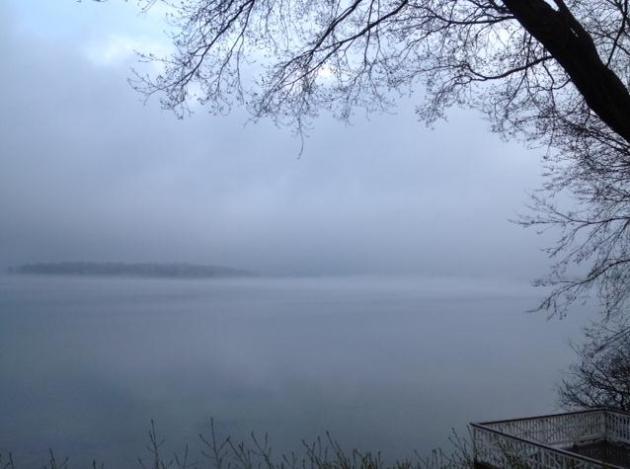
So long May-rch!
"We'll probably never live through another March like the one we just had" said Dan Luna, Chief at the local, Twin Cities National Weather Service. We were chatting up 19 warm weather records at MSP since March 10. Luna shook his head, a look of awe on his face. "We saw a DOUBLING of normal temperatures; daytime highs TWICE what they should have been, nights 2.5 times milder than average. If this trend continues we'll see highs near 180 F by July" he joked. I think he was kidding. Right?
I think he was kidding.
A month 16 F warmer than average? You just lived through the warmest March ever recorded. Chicago saw the 5th warmest April - in March. Off-the-scale bizarre. 18,009 USA records in March.
Why? A lack of snow, nationwide. A warm Gulf of Mexico, and a "stuck" jet stream trapping bitter air way up north.
Saturday was a bust, a nagging inversion keeping us gray/raw. 70s should return today (90 southwest MN?) 60s return this week (brr..) We should avoid a frost; the GFS hints at frost by mid-April. I'm a bit skeptical, but I'll be shocked if we don't have at least one more frosty encounter between now and Mother's Day. Then again I've spent the last 3 weeks in a state of perpetual shock, so all bets are off.
Nature is confused and so are the weather models. What season is this again? Expect mid-70s later today (90 over southwest MN).
No big storms in sight through mid-April. Our drought is getting worse.
Climate Stories...
"
Americans can be counted on to do the right thing, after they've exhausted all other possibilities..." - Winston Churchill
"
I live near Hibbing, and we've had a ridiculous number of days in the 60s and 70s just this month. This is March in Northern MN. As much as I love warm weather, I'm starting to get freaked out by the lack of cold and snow."
- Amalia Palaganas Spagnolo, Hibbing.
 Making Sense Of The Wacky Weather
Making Sense Of The Wacky Weather. Here's a interesting story in
The New York Times: “
My answer on that has evolved,” replied one, J. Marshall Shepherd. He’s the head of atmospheric sciences at the University of Georgia and the president-elect of the American Meteorological Society, the leading group for scientists seeking to understand and predict weather and climate. “I used to say things like, ‘It’s really difficult to attribute any one single event to climate change, but some of these are certainly consistent with what our broad body of science says is occurring,’” Dr. Shepherd said. “More recently, I’ve been saying: ‘We may already be seeing examples of a new normal.’” In other words, scientists are getting bolder about linking the crazy weather patterns, and even specific events, to global warming caused by human activity. Still, even the boldest acknowledge that it’s a difficult exercise."
Photo credit above: "
A roller blader takes advantage of a warm weather in a park Wednesday, Jan. 3, 2007, in Columbus, Ohio. Much of the Midwest and the East Coast has experienced unusually warm temperatures during the first weeks of winter - making for some odd sights in a season that usually brings to mind residents bundled up in down coats and stocking caps. (AP Photo/Kiichiro Sato)."
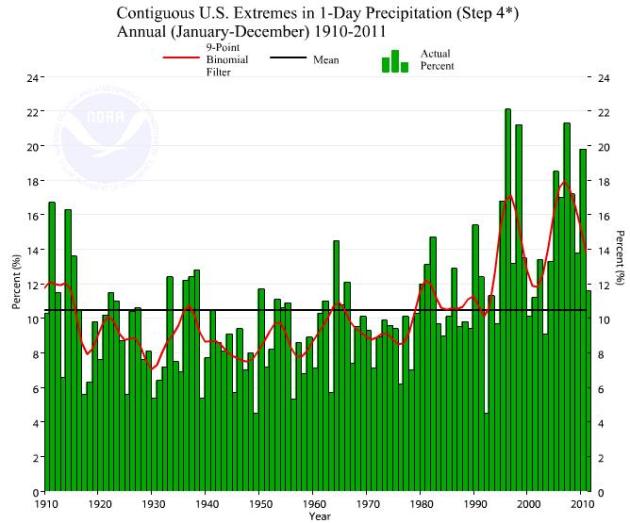 Linking Weird Weather To Rapid Warming Of The Arctic
Linking Weird Weather To Rapid Warming Of The Arctic. Here's a fascinating article at
Yale's Environment 360, from Jennifer Francis, who links rapidly melting Arctic ice with some of the eyeball-popping weather extremes in recent years: "
Extra heat entering the vast expanses of open water that were once covered in ice is released back to the atmosphere in the fall. This has led to an increase in near-surface, autumn air temperatures of 2 to 5 degrees C (3.6 to 9 degrees F) over much of the Arctic Ocean during the past decade. All that extra heat being deposited into the atmosphere cannot help but affect the weather, both locally and on a large scale. And there are growing indications that some weather phenomena in recent years — such as prolonged cold spells in Europe, heavy snows in the northeastern U.S. and Alaska, and heat waves in Russia — may be related to Arctic amplification."
* CEI Index above shows extreme one-day precipitation events in the USA since 1910, courtesy of NOAA's
NCDC.
Positive Proof Of Global Warming. Enough said. Yes, we need to (try) and keep a sense of humor as we "debate the science". For the record, I don't read what the trolls hiding behind their laptops have to say. I honestly don't care. The next time someone sends you a link from a denial-blog or talk radio, send them this photo. I take the subject seriously; I'm trying not to take myself seriously. Big distinction. One of these days we'll sit down and have a rational dialogue.
Hunters, Anglers Report Warming Winters Bad For Wildlife. I can't tell you the number of Minnesota fishermen and hunters who are reporting back first-hand observations of changing conditions, literally, out in the field - and in Minnesota's lakes and streams. Changing/morphing migration patterns, impact on the quantity and quality of fish in some of our lakes. You've heard the adage "no atheists in foxholes?" Well, people that spend a lot of time outside, farmers, hunters, anglers, sportsmen (even pilots) report changes to Minnesota's seasons and weather patterns. No, you're not imagining it. Here's an excerpt from
The L.A. Times: "
The relationship between that community and environmentalists has been testy over the years, but the real effects of climate change are one place they find common ground. And, apparently, a lot of it. “We work with a lot of sportsmen and -women across the nation, and we constantly hear back from them that they’re seeing the effects of climate change on the ground,” says Joe Mendelson, policy director for the Climate and Energy program at the National Wildlife Federation. “The changes might seem subtle to to some, but they see them in their outdoor pursuits maybe more readily than others.”
Photo credit above: "
Saugers and walleyes were falling to Dick "Griz" Grzywinski's jig-and-minnow combinations, March 14, 2012, in Red Wing, Minnesota. (Dennis Anderson/Minneapolis Star Tribune/MCT)."
In U.S., Global Warming Views Steady, Despite Warm Winter. Some interesting data from
Gallup: "
PRINCETON, NJ -- About half of Americans, 52%, say the effects of global warming have already begun to happen, consistent with views since 2009. However, this remains down from prior years, when as many as 61% believed global warming was already manifesting itself. Today's level of belief that global warming is already apparent is similar to what Gallup found in 1997 and from 2001 through 2005. During those periods, however, somewhat fewer than today's 15% said its effects would never happen."
Has Global Warming Brought An Early Summer To The U.S.? The story from
New Scientist: "
North America has been experiencing unusual weather of late. After a mild winter over much of the continent, last week it experienced record-breaking summer-like conditions. In Canada, for instance, the thermometer in St John's, New Brunswick, hit 25.4 °C on 21 March, smashing the previous record high for March of 17.5 °C. "We've never seen these kinds of temperatures before. It's quite remarkable," Dave Phillips, a senior climatologist at Environment Canada, a government agency, told local media. "The duration, areal size, and intensity of the 'summer in March' heat wave are simply off-scale," says Jeff Masters of the Weather Underground. "The event ranks as one of North America's most extraordinary weather events in recorded history."
Photo credit above: "
In this undated image taken in Bridgton, Maine, an array of spring daffodils, tulips and grape hyacinth are shown in a garden in early summer. (AP Photo/Rosanne Dombek)."
The Reason For Climate Denialism: Is It Reasonable? Here's a
thoughtful post from Neil Wagner at Huffington Post: "
The scientific method asks that ideas be challenged and tested. But the challenges should meet a minimum level of common sense. As Bebbo expresses in today's cartoon, price tags are irrelevant to the authenticity of global warming. Let's look at some other popular rationales for climate change denial and see how they hold up when applied to scenarios we can all relate to more easily...
"There is no scientific consensus on climate change."
If 98 out of 100 orthodontists said you needed braces, would you ignore them because your allergist felt braces weren't needed? Study after study shows that a near unanimity of climate scientists (who are actively studying climate change) believe in anthropogenic global warming.
"We had a cold, snowy winter. That means the climate isn't warming."
I visited Florida one time and experienced chilly rain all week. Does that mean Florida is not a warm, sunny state?
"God would not give mankind the power to change the environment."
Evangelical environmentalists would disagree, saying God wants us to be proper stewards of His creation. Plus He gave us free will, right?"
Poking A Hornet's Nest. The recent article/Op-Ed that ran in the Huffington Post and a few other publications gave me a chance to summarize how I feel about the politicization of climate science in recent years - how it's become a bizarre litmus test for conservatism. As I describe in the piece, my "belief" in climate science had nothing to do with Al Gore, and everything to do with what I was seeing with my own two eyes: on Minnesota's weather maps, and out my window. I'm not running a popularity contest (Q Ratings were important when I was in local broadcasting...news directors didn't want any "negatives", nothing that might turn off a potential viewer), but no more. This issue is too important, and I'm hoping I can encourage other (moderate) voices out there to step out from the shadows and speak up about their concerns. What we're witnessing (2 most severe years in U.S. history dating back to 1816), 1-in-500 year floods every other year, and now, a taste of July in March, are all tips of the climate iceberg. It's a warning shot across the bow. It's time to speak up, tell your representatives that status quo just isn't going to cut it. D.C. is hopelessly gridlocked on climate science and (clean, carbon-free) energy policy. We need to have a real & honest debate, but I fear it might degenerate into a climate inquisition, the way everything in D.C. is polarized right now. I can't believe it's come to this.
I have no idea what it's going to take to move things along and start a rational, national dialogue (without shouting at each other and the name-calling...I swear we're still in 7th grade, with slightly better clothing)...but we're not doing ourselves any favors by ignoring the obvious. If this keeps up we'll be buying all our wind farms, solar panels and hybrids from China, South Korea, Japan and other countries that aren't still "debating the science." Are we really going to drill and mine our way to prosperity - indefinitely? I have nothing against drilling and tapping the resources we already have, so long as it's not the only way forward. Keep track of who the (professional/persistent) deniers and Internet Trolls are out there today. Let's come back in a few years and see what they have to say - what excuses they have for ignoring the science and putting our kids and future generations at risk. That should be interesting.
Here is a link to
Andy Revkin's Dot Earth Blog in the New York Times. Shawn Otto posted the full Op-Ed at his
Neorenaissance Blog, and it can also be found at
The Huffington Post. And to those of you who have e-mailed, tweeted, texted and called in your support and encouragement. Thank you. I'm no meteorological martyr or Paul Revere - but I've seen enough evidence to make a call on this one.
It's either the greatest scientific hoax ever perpetrated on the people of Earth - or the climate scientists are correct. No middle ground on this one. Call me crazy but I think it's possible to lean to the right, and still care about the environment and sound science. If that makes me a "RHINO" (Republican In Name Only) then I'll wear the badge proudly. Come to think of it...I think the forecast calls for more rhinos.
General Motors Decides Climate Change Is Real, Pulls Support From Heartland Institute. An update from
Huffington Post: "
After getting called out by an environmental group, General Motors has pulled support from the Heartland Institute, a Chicago-based nonprofit well-known for attacking the science behind global warming and climate change. The automaker told the Heartland Institute last week that it won't be making further donations, spokesman Greg Martin said. At a speech earlier this month, GM CEO Dan Akerson said his company is running its business under the assumption that climate change is real. "We applaud GM's decision and the message it sends -- that it is no longer acceptable for corporations to promote the denial of climate change and that support for an organization like Heartland is not in line with GM's values," said Daniel Souweine, campaign director for Forecast the Facts, a group that urges meteorologists to talk more openly about climate change."
Photo credit above: "
This undated image made available by Chevrolet shows the 2012 Chevrolet Volt. (AP Photo/General Motors.)"
Climate Change: Flu Pandemics Linked To Strange Weather? Here is an eyebrow-raising article from The Mother Nature Network by way of
The Huffington Post: "
What do the Pakistan floods, the Queensland floods, and the drought in Africa during 2010 and 2011 have in common with a hundred years of flu outbreaks? They may all be attributed to the ocean-atmosphere phenomenon known as La Niña -- conspirator of El Niño. Together the two create the broader El Niño-Southern Oscillation climate pattern. Changes in global atmospheric circulation accompany La Niña and affect jet streams and the behavior of storms in both the Northern and Southern hemispheres, often resulting in extreme weather bringing about floods and drought."
Photo credit above: "
An Indian health official culls a duck to curb the spread of bird flu, as poultry fell ill and died in new areas in the region, in Badha village, Margram, about 270 kilometers (167 miles) north of Calcutta, India, Thursday, Jan. 17, 2008. Fears of bird flu and a pandemic that once dominated headlines have largely vanished in the West, but the virus has quietly continued killing people and poultry in Asia as health experts warn that the threat remains unchanged.(AP Photo/Bikas Das)."
Shale Gas, Fueling An Economic Revolution. Gas is (much) cleaner than coal and oil, a big step in the right direction. And America has plenty of it, with new techniques ("hydro-fracking") able to extract natural gas. There's no question (in my mind) that natural gas is going to be a huge part of our gradual, inevitable transition from coal and oil to cleaner forms of energy.
The Washington Post has an Op Ed from Fareed Zakaria (who has a terrific show on CNN every Sunday): "
No one could have predicted that oil prices would rise to today’s levels. Saudi Arabia’s oil minister, Ali al-Naimi, says that they are irrationally high, pointing out that world demand is lower than the available supply and that Saudi oil inventories around the world are largely untapped. The “irrational” cause, of course, is fear of a war with Iran. But it would also have been unpredictable that a 47 percent hike in oil prices since November 2010 would not cause a major slowdown in the U.S. economy. One reason it hasn’t might well be the rise of shale gas."
Photo credit above: "
In this July 27, 2011 file photo, Range Resources workers stand near the rig that drills into the shale at a well site in Washington, Pa. The company is one of many drilling and "fracking" in the area to release natural gas. The federal government needs to track safety hazards tied to thousands of unregulated pipelines gathering new oil and gas supplies released through the fracking process, according to a new report by the Government Accountability Office. (AP Photo/Keith Srakocic, File)."
Climate Change Panel Says Expect More Extreme Weather. Here's another angle on the climate change/extreme weather meme from
Voice of America: "
Over the last half-century, global warming has led to changes in climate extremes such as heat waves, record high temperatures and in many regions, heavy precipitation. That’s the conclusion of a new report by the Intergovernmental Panel on Climate Change. The group, founded by the United Nations in 1988, warns that nations across the globe must take steps to mitigate such disaster. Extreme weather cut a swath across the world in 2011. For Bill Wing, it began a year ago on New Year’s Day as he surveyed the damage from a tornado that touched down in Cincinnati, Arkansas." Photo above: Reuters.
For Katherine Hayhoe, Climate Change Not A Leap of Faith. Here are a few excepts from a
Climate Central article: ...“
In the U.S., evangelical Christians tend to be politically conservative, and even anti-science,” said the Canadian-born Hayhoe. “So in scientific circles, saying you’re an evangelical Christian is like saying ‘I check my brain at the door.’ I seriously wondered what this would do to my scientific reputation — was I tossing everything I’d done in the toilet?”...But good answers about the science, Hayhoe said, are not always enough, because much of the opposition is emotional, not fact based. So she tries to make a connection based on what she has in common with her listeners. “ I can’t just say, ‘I’m a scientist,’” she said. “I am a human, a mother, an evangelical Christian who knows that Jesus said to love God and love your neighbor as yourself. The impacts of climate change are going to fall disproportionately on the poorest. Who doesn’t believe we should take care of the poor and needy? When I start from that place, I’ve seen dramatic shifts. People say ‘what can I do about it?’ ”
Resource Depletion A Bigger Threat Than Climate Change? An article (and interview) at
Huffington Post: "
Rising geopolitical tensions and high oil prices are continuing to help renewable energy find favor amongst investors and politicians. Yet how much faith should we place in renewables to make up the shortfall in fossil fuels? Can science really solve our energy problems, and which sectors offers the best hope for our energy future? To help us get to the bottom of this, Oilprice.com spoke with energy specialist Dr. Tom Murphy, an associate professor of physics at the University of California. Tom runs the popular energy blog Do the Math which takes an astrophysicist's eye-view of societal issues relating to energy production, climate change, and economic growth."
Photo credit above: "
Fred Donath, of Dubuque, Iowa, tries his luck fishing at Heritage Pond in Dubuque after the Iowa Department of Natural Resources stocked the pond with about 1800 rainbow trout Thursday, March 8, 2012. More than 130 million fish are stocked annually into Iowa waters, according to the D.N.R. (AP Photo/Telegraph Herald, Jeremy Portje)."
Scientists Warn Of Climate Change Onslaught. An excerpt from
The Chicago Sun Times: "....
Already U.S. insured losses from weather disasters have soared from an average of about $3 billion a year in the 1980s to about $20 billion a year in the last decade, even after adjusting for inflation, said Mark Way, director of sustainability at insurance giant Swiss Re. Last year that total rose to $35 billion, but much of that was from tornadoes, which scientists are unable to connect with global warming. U.S. insured losses are just a fraction of the overall damage from weather disasters each year. Globally, the scientists say that some places, particularly parts of Mumbai in India, could become uninhabitable from floods, storms and rising seas. In 2005, over 24 hours nearly 3 feet of rain fell on the city, killing more than 1,000 people and causing massive damage. Roughly 2.7 million people live in areas at risk of flooding."
Photo credit above: "
In this March 30, 2004 file photo, Tarawa atoll, Kiribati, is seen in an aerial view. Fearing that climate change could wipe out their entire Pacific archipelago, the leaders of Kiribati are considering an unusual backup plan: moving the populace to Fiji. Kiribati President Anote Tong told The Associated Press on Friday, March 9, 2012 that his Cabinet this week endorsed a plan to buy nearly 6,000 acres on Fiji's main island, Viti Levu. He said the fertile land, being sold by a church group for about $9.6 million, could provide an insurance policy for Kiribati's entire population of 103,000, though he hopes it will never be necessary for everyone to leave. (AP Photo/Richard Vogel, File)."
"
Republicans and Climate Change: An Audience Analysis of Predictors for Belief and Policy Preferences." Here's a
paper for people who may lean toward the right politically, but still acknowledge that the climate is changing, from The Social Science Research Network. Here is the Abstract:
"Climate change is increasingly polarized within American politics. Yet, political orientation and climate change views are not synonymous, and research identifying the characteristics of counter-normative groups — such as Republicans concerned about climate change — is key to communication strategies to encourage wider acceptance of science-based views about climate change across the political spectrum. The evidence presented here demonstrates that there are distinct and reliable predictors of which Republicans are more likely to believe that climate change is occurring and express support for mitigation policies. While some of these variables (such as religiosity) are relatively inaccessible to climate change communication campaigns, others (such as correctly understanding the scientific consensus that climate change is happening) should likely form the cornerstone of communication efforts. The current study provides strong guidance on where to begin, and where more research is needed to better understand these phenomena."





